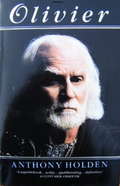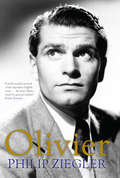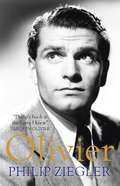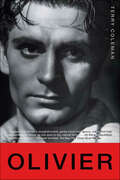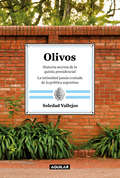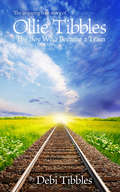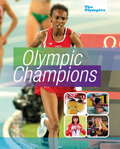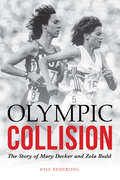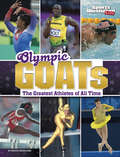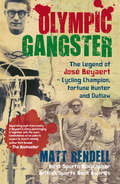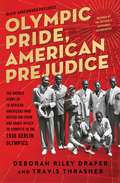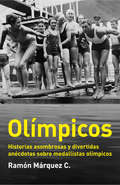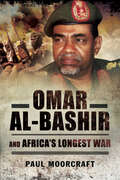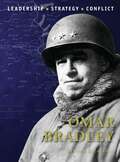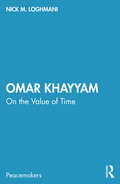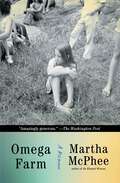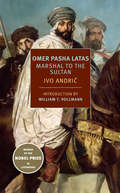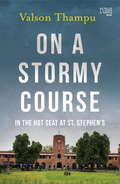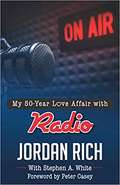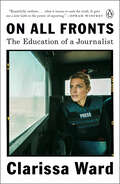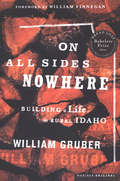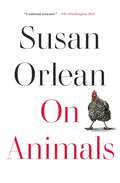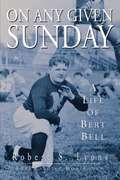- Table View
- List View
Olivier
by Anthony HoldenThis is a biography of Laurence Olivier, the actor, director, impresario, founder of the National Theatre, Oscar-winning film star and the first peer in the history of the profession.
Olivier
by Anthony HoldenThis is a biography of Laurence Olivier, the actor, director, impresario, founder of the National Theatre, Oscar-winning film star and the first peer in the history of the profession.
Olivier
by Philip ZieglerA finalist for the Sheridan Morley Prize that has been called "probably the best Olivier book for general readers" (Kirkus Reviews), Philip Ziegler's Olivier provides an incredibly accessible and comprehensive portrait of this Hollywood superstar, Oscar-winning director, and one who is considered the greatest stage actor of the twentieth century. The era abounded in great actors--Gielgud, Richardson, Guinness, Burton, O'Toole - but none could challenge Laurence Olivier's range and power. By the 1940s he had achieved international stardom. His affair with Vivien Leigh led to a marriage as glamorous and as tragic as any in Hollywood history. He was as accomplished a director as he was a leading man: his three Shakespearian adaptations are among the most memorable ever filmed. And yet, at the height of his fame, he accepted what was no more than an administrator's wage to become the founding Director of the National Theatre. In 2013 the theatre celebrates its fiftieth anniversary; without Olivier's leadership it would never have achieved the status that it enjoys today. Off-stage, Olivier was the most extravagant of characters: generous, yet almost insanely jealous of those few contemporaries whom he deemed to be his rivals; charming but with a ferocious temper. With access to more than fifty hours of candid, unpublished interviews, Ziegler ensures that Olivier's true character--at its most undisguised--shines through as never before.
Olivier
by Philip ZieglerHollywood superstar; Oscar-winning director; greatest stage actor of the twentieth century. The era abounded in great actors - Gielgud, Richardson, Guinness, Burton, O'Toole - but none could challenge Laurence Olivier's range and power. By the 1940s he had achieved international stardom. His affair with Vivien Leigh led to a marriage as glamorous and as tragic as any in Hollywood history. He was as accomplished a director as he was a leading man: his three Shakespearian adaptations are among the most memorable ever filmed. And yet, at the height of his fame, he accepted what was no more than an administrator's wage to become the founding Director of the National Theatre. In 2013 the theatre celebrates its fiftieth anniversary; without Olivier's leadership it would never have achieved the status that it enjoys today. Off-stage, Olivier was the most extravagant of characters: generous, yet almost insanely jealous of those few contemporaries whom he deemed to be his rivals; charming but with a ferocious temper. With access to more than fifty hours of candid, unpublished interviews, Philip Ziegler ensures that Olivier's true character - at its most undisguised - shines through as never before.
Olivier
by Philip ZieglerHollywood superstar; Oscar-winning director; greatest stage actor of the twentieth century. The era abounded in great actors - Gielgud, Richardson, Guinness, Burton, O'Toole - but none could challenge Laurence Olivier's range and power. By the 1940s he had achieved international stardom. His affair with Vivien Leigh led to a marriage as glamorous and as tragic as any in Hollywood history. He was as accomplished a director as he was a leading man: his three Shakespearian adaptations are among the most memorable ever filmed. And yet, at the height of his fame, he accepted what was no more than an administrator's wage to become the founding Director of the National Theatre. In 2013 the theatre celebrates its fiftieth anniversary; without Olivier's leadership it would never have achieved the status that it enjoys today. Off-stage, Olivier was the most extravagant of characters: generous, yet almost insanely jealous of those few contemporaries whom he deemed to be his rivals; charming but with a ferocious temper. With access to more than fifty hours of candid, unpublished interviews, Philip Ziegler ensures that Olivier's true character - at its most undisguised - shines through as never before.
Olivier: The Story Of A Great Theatre From Kean To Olivier To Spacey
by Terry ColemanBased on exclusive, unprecedented access, the definitive biography of Sir Laurence Olivier, the dashing, self-invented Englishman who became the greatest actor of the twentieth centurySir Laurence Olivier met everyone, knew everyone, and played every role in existence. But Olivier was as elusive in life as he was on the stage, a bold and practiced pretender who changed names, altered his identity, and defied characterization. In this mesmerizing book, acclaimed biographer Terry Coleman draws for the first time on the vast archive of Olivier's private papers and correspondence, and those of his family, finally uncovering the history and the private self that Olivier worked so masterfully all his life to obscure. Beginning with the death of his mother at age eleven, Olivier was defined throughout his life by a passionate devotion to the women closest to him. Acting and sex were for him inseparable: through famous romances with Vivien Leigh and Joan Plowright and countless trysts with lesser-known mistresses, these relationships were constantly entangled with his stage work, each feeding the other and driving Olivier to greater heights. And the heights were great: at every step he was surrounded by the foremost celebrities of the time, on both sides of the Atlantic—Richard Burton, Greta Garbo, William Wyler, Katharine Hepburn. The list is as long as it is dazzling.Here is the first comprehensive account of the man whose autobiography, written late in his life, told only a small part of the story. In Olivier, Coleman uncovers the origins of Olivier's genius and reveals the methods of the century's most fascinating performer.
Olivos: Historia secreta de la quinta presidencial. La intimidad jamás contada de la política argentina
by Soledad VallejosLa Residencia Presidencial de Olivos, desde su donación hasta la actualidad, ha sido el espacio íntimo del poder en la Argentina. El libro de Soledad Vallejos retrata usos y costumbres de los distintos presidentes y sus familias, de trabajadores, de ocupantes ocasionales y visitantes, a partir de una rigurosa y amplia investigación, y con una prosa ágil y atrapante. La Quinta de Olivos es un lugar del que todos hablan pero pocos conocen. Allí Perón tenía un tigre, y Aramburu, perros que andaban por la casa, cerca de la cual hoy yace, enterrada bajo un árbol, una bóxer llegada de la Patagonia con los Kirchner. Durante los cacerolazos de diciembre de 2001, cientos de desconocidos treparon al muro y amagaron con invadir el predio mientras De la Rúa dormía. En el microcine, Alfonsín vio el partido que consagró a la Argentina en el mundial de México 86, y anunció un cambio de gabinete que haría historia. Cuando la Triple A asolaba las calles, Isabelita exhibió en una cripta los restos de Perón y Evita. La Residencia Presidencial también fue escenario del casamiento elegante de la hija de Illia, la vida familiar de Videla y las leyendas tejidas al calor del menemismo. Pero, ante todo, de la cotidianeidad del poder político, que custodia con discreción lo que pasa tras el muro rojo. Nadie había presentado hasta ahora una investigación similar. Con entrevistas, archivos históricos y recorridos por el lugar, Soledad Vallejos descubre en Olivos las historias secretas de los presidentes que habitaron en la Residencia y de los empleados que velan por ella, para relatar la vida íntima de la política argentina.
Ollie Tibbles
by Debi TibblesWhen 4-year-old Ollie Tibbles was asked what he wanted to be when he grew up, he answered, "I'm going to be a train!" Four years later at Union Station-Chicago, at Make-A-Wish Foundation's Grand Ball, Ollie's prediction and wish came true. Ollie's mother shares the story of his struggle with brain cancer and how pain was transformed into possibility.
Olympic Champions (The Olympics #4)
by Nick HunterFrom Usain Bolt and Jessica Ennis to Michael Phelps and Tom Daley, this book looks at potential champions.
Olympic Collision: The Story of Mary Decker and Zola Budd
by Kyle KeiderlingIt remains one of the most memorable moments in modern Olympic history. At the 1984 summer games in Los Angeles, a raucous crowd of ninety thousand saw their favorite in the women’s 3,000-meter race, Mary Decker, go down. An audience of two billion around the world witnessed the mishap and listened to the instantaneous accusations against the suspected culprit, Zola Budd. Just seventeen, the South African Budd had already been the target of a vicious and vocal campaign by the antiapartheid lobby after she transferred to the British team in order to compete at the games. Decker, at twenty-six, was America’s golden girl, ready to overcome years of bad luck and injuries to rightfully take the Olympic gold for which she had waited so long. With three laps to go, Decker and Budd’s feet became tangled. Decker went down and didn’t get up, wailing in primal agony as her gold medal hopes vanished. Decker’s stumbles continued in the race’s aftermath when she refused Budd’s apology and race officials found her, not Budd, at fault for the collision. Although both women found success after the Olympics, neither could escape the long shadow of the infamous event that forever changed both of their lives and defines them in popular culture to this day.Olympic Collision follows Decker and Budd through their lives and careers, telling the story behind the controversy; the account that emerges is certain to revise the view Americans, in particular, have held since that fateful day in Los Angeles more than thirty years ago. Olympic Collision relives one of the most famous incidents in Olympic history, its legacy, and what has happened to both athletes since.
Olympic GOATs: The Greatest Athletes of All Time (Sports Illustrated Kids: GOATs)
by Bruce BerglundHow do you pick Olympic GOATs? Is it gymnast Simone Biles or swimmer Michael Phelps? Or maybe it’s the entire 1992 basketball team. With so many sports, how do you choose? It comes down to stats, history, and hunches. Read more about some of the legends of the Olympic Games and see if you agree that they’re the greatest of all time.
Olympic Gangster: The Legend of José Beyaert - Cycling Champion, Fortune Hunter and Outlaw
by Matt RendellRestlessly vital and possessed of great physical strength, José Beyaert lived many lives. During the Second World War, he boxed and trafficked arms for the Resistance on his bicycle. After it, he became an international cyclist. In 1948, a mile from the end of the Olympic road race around Windsor Park, he broke away alone to take the gold medal and started an adventure that would last the rest of his life. A Tour de France rider in the sport's golden age, José was invited to open a new velodrome in Colombia, South America. He travelled, intending to stay a month. Instead, driven by his thirst for adventure, he stayed for fifty years, becoming by turns athlete, coach, businessman, emerald-trader, logger, smuggler, perhaps even hired killer. Matt Rendell, who knew José Beyaert and met many of his family, friends and associates, tells the fascinating story of an almost-forgotten sporting hero who, incapable of living by other people's rules, lived his many lives on his own terms.
Olympic Pride, American Prejudice: The Untold Story of 18 African Americans Who Defied Jim Crow and Adolf Hitler to Compete in the 1936 Berlin Olympics
by Travis Thrasher Blair Underwood Deborah Riley DraperIn this &“must-read for anyone concerned with race, sports, and politics in America&” (William C. Rhoden, New York Times bestselling author), the inspirational and largely unknown true story of the eighteen African American athletes who competed in the 1936 Berlin Olympic Games, defying the racism of both Nazi Germany and the Jim Crow South.Set against the turbulent backdrop of a segregated United States, sixteen Black men and two Black women are torn between boycotting the Olympic Games in Nazi Germany or participating. If they go, they would represent a country that considered them second-class citizens and would compete amid a strong undercurrent of Aryan superiority that considered them inferior. Yet, if they stayed, would they ever have a chance to prove them wrong on a global stage? Five athletes, full of discipline and heart, guide you through this harrowing and inspiring journey. There&’s a young and feisty Tidye Pickett from Chicago, whose lithe speed makes her the first African American woman to compete in the Olympic Games; a quiet Louise Stokes from Malden, Massachusetts, who breaks records across the Northeast with humble beginnings training on railroad tracks. We find Mack Robinson in Pasadena, California, setting an example for his younger brother, Jackie Robinson; and the unlikely competitor Archie Williams, a lanky book-smart teen in Oakland takes home a gold medal. Then there&’s Ralph Metcalfe, born in Atlanta and raised in Chicago, who becomes the wise and fierce big brother of the group. From burning crosses set on the Robinsons&’s lawn to a Pennsylvania small town on fire with praise and parades when the athletes return from Berlin, Olympic Pride, American Prejudice has &“done the world a favor by bringing into the sunlight the unknown story of eighteen black Olympians who should never be forgotten. This book is both beautiful and wrenching, and essential to understanding the rich history of African American athletes&” (Kevin Merida, editor-in-chief of ESPN&’s The Undefeated).
Olímpicos: Historias asombrosas y divertidas anécdotas sobre medallistas olímpicos
by Ramón Márquez C.Historias asombrosas y divertidas anécdotas de héroes de carne y hueso sobre medallistas olímpicos Hace cerca de tres mil años una antorcha se encendió en Grecia para celebrar los juegos olímpicos en honor a Zeus, pero no fue hasta finales del siglo XIX que flameó en Atenas la llama de los primeros juegos de la era moderna. Desde entonces, atletas de todo el mundo han luchado por ganar el podio y muchos lo han conseguido. Son los medallistas olímpicos, protagonistas de historias asombrosas como Richard Norris y Cosmo Duff, dos supervivientes de la tragedia del Titanic, o Johnny Weissmuller, Herman Brix, Glenn Morris y Buster Crabbe, los cuatro tarzanes de Hollywood, un rey nórdico, un asesino y hasta un premio Nobel de la Paz.
Omar Al-Bashir and Africa's Longest War
by Paul MoorcraftPresident Omar al-Bashir is Africa's and arguably Arabia's most controversial leader. In power since 1989, he is the first sitting head of state to be issued with an arrest warrant, for war crimes, by International Criminal Court.He has been a central personality in Islamic and African politics, as well as a love-to-hate figure for the US in the 'war on terror'.For military history readers, Al-Bashir is a field marshal who has fought possibly the world's longest conflict. Modern Sudan has been embroiled in war since 1955.No proper biography has been written on him before. Nor has there been a comprehensive military history of Sudan. The book briefly covers the military background until independence. Then it dissects the long north-south civil war until Bashir's Islamist military coup in 1989. Thereafter it narrates the wars in the east, south, west (in Darfur), International political and military intervention is also factored in.The author draws on in-depth one-on-one interviews with Bashir himself and his family and close political, military and intelligence colleagues.
Omar Bradley
by Steven Zaloga Steve NoonGeneral Omar Bradley was the premier US Army tactical commander in the European Theater of Operations in 1944-45. A West Point classmate of Dwight Eisenhower, Bradley was the quintessential US field commander of World War II, elevated to high command with little combat experience but a solid track record as a skilled planner and organizer. Bradley was part of a small cadre of highly skilled young officers groomed for higher command in the austere and bankrupt 1930s. Bradley began World War II in creating the new 82nd Division which would go on to fame as one of the US Army's premier airborne divisions. Bradley spent most of the early years of the war in George Patton's shadow, first as an assistant corps commander under Patton in Tunisia in early 1943, then as a corps commander under Patton on Sicily in July 1943. Patton's social blunders pushed him out of contention for the coveted spot leading the First US Army on D-Day, and Bradley's sterling performance on Sicily won him the position.Bradley was at the center of nearly all the major US Army victories in 1944-45 from D-Day through the final push into Germany. After commanding the US First Army in Normandy, Bradley was elevated to the command of the 12th Army Group, which contained the three main American field armies in the autumn of 1944. Along with that combat record came a string of controversies. Bradley's great victories like Operation Cobra in July-August 1944 were brought in to question by more dubious campaigns such as the miserable battles for the Hurtgen forest and the lesser-known Operation Queen in the autumn of 1944. Bradley's greatest blunder, failing to anticipate the German offensive in the Ardennes, was counter-balanced by a vigorous and skilled response which fatally injured the German army in the West. Beyond the performance of the US Army in the ETO, Bradley was also intimately wrapped up in other controversies, especially the internecine squabbles with his British counterpart, Bernard Montgomery.
Omar Khayyam: On the Value of Time (Peacemakers)
by Nick M. LoghmaniThis book explores the life and work of Omar Khayyam as a provocateur of peace. While Khayyam is known for his poetry, he was foremost a prominent mathematician who looked at the world from a unique perspective. Using the transformative power of mathematics, he brought together seemingly irreconcilable concepts in his work. Through his art, philosophy, and mathematics, Khayyam sought to create harmony between what on the surface looks like a clash between his scientific view, romantic and often provocative poetry, and philosophy. The book sheds light on his spiritual and philosophical journey through a cross-sectional account of his poetry, philosophical view, and mathematics and science. It explores the complex inner life of a multidimensional scholar as he negotiated between faith and science, constructing a framework for peace by looking at the world as it presents itself to us, contemplating the temporality of life and enriching it with wisdom and joy. Historically and culturally informed, this book will be indispensable to readers of Omar Khayyam’s poetry and philosophy. It will also be of interest to students and researchers of peace and conflict studies, mathematics, science, Middle East literature, history, and popular culture.
Omega Farm: A Memoir
by Martha McPhee*A New Yorker and Vogue Best Book of 2023* &“Compelling... [McPhee] positions herself neither as victim nor saint but as someone who, she says, only wants to be good.&” —The Washington Post A moving memoir from an award-winning novelist—a riveting account of her complicated, bohemian childhood and her return home to care for her ailing mother.In March 2020, Martha McPhee, her husband, and their two children set out for her childhood home in New Jersey, where she finds herself grappling simultaneously with a mother slipping into severe dementia and a house that&’s fallen into neglect. As Martha works to manage her mother&’s care and the sprawling, ramshackle property—a broken septic system, invasive bamboo, dying ash trees—she is swept back, unwillingly, into memories of her fraught, dysfunctional childhood. In this masterful exploration of a complicated family legacy, McPhee &“makes no effort to spare her own flaws even as she searches for the roots of her mature turmoil in the shortcomings of adults who failed in the fundamental task of protecting her younger self&” (BookPage). Omega Farm is an &“expansive&” (New Yorker) testament to hope in the face of suffering, and a courageous tale about how returning home can offer a new way to understand the past.
Omer Pasha Latas: Marshal to the Sultan
by Ivo Andric William T. Vollmann Celia HawkesworthA sweeping epic by Nobel Prize-winner Ivo Andrić about power, identity, and Islam set in 19th-century Ottoman Bosnia and Istanbul.Omer Pasha Latas is set in nineteenth-century Sarajevo, where Muslims and Christians live in uneasy proximity while entertaining a common resentment of faraway Ottoman rule. Omer is the seraskier, commander in chief of the Sultan’s armies, and as the book begins he arrives from Istanbul, dispatched to bring Sarajevo’s landowners to heel, a task that he accomplishes with his usual ferocityand efficiency. And yet the seraskier’s expedition to Bosnia is a time of reckoning for him as well: he was born in the Balkans, a Serb and a subject of the Austro-Hungarian Empire, a bright boy who escaped his father’s financial disgrace by running away and converting to Islam. Now, at the height of his power, he heads an army of misfits, adventurers, and outcasts from across Europe and Asia, and yet wherever he goes he remains a stranger. Ivo Andrić, who won the Nobel Prize in 1961, is a spellbinding storyteller and a magnificent stylist, and here, in his final novel, he surrounds his enigmatic central figure with many vivid and fascinating minor characters, lost souls and hopeless dreamers all, in a world that is slowly sliding towards disaster. Omer Pasha Latas combines the leisurely melancholy of Joseph Roth’s The Radetzky March with the stark fatalism of an old ballad.
On A Stormy Course: In the Hot Seat at St. Stephen's
by Valson ThampuWhat is the institution that the world knows as St. Stephen?s College, Delhi? Is it only an anthology of nostalgic tales, mythological anecdotes, free-wheeling assertions and transitory opinions? Or does it have a distinctive birth that defines its worth and dictates its mission? For four decades, Reverend Valson Thampu served St. Stephen?s College, Delhi, first as a member of the faculty and then as principal, significantly impacting the stature of this prestigious educational institution. The last nine years of his tenure were rife with controversy. From accusations that he was `Christianizing? the college to contentious debates over his educational qualifications to allegations that he was curbing the fundamental rights of the students, Reverend Thampu faced a constant barrage of storms. In On a Stormy Course, Reverend Thampu lays bare, for the first time, the truth behind those years of tumult. Against the backdrop of the vision and ideals of the founding fathers of the institution that in turn shaped his own principles and professional ethics, he reveals how he stayed steadfast and committed to the betterment of his alma mater in the face of hostile peers, media trials and public scorn. As thought-provoking as it is searing, this account offers a ringside view of the inner life of higher academics in India, mired as it is in disruptive institutional politics and unfortunate compromise. The incisive insights it presents reveal how rejuvenating and reforming India?s higher education system could well enable the country?s venerated institutions to serve their purpose of shaping young minds and thus, ultimately, the nation itself.
On Air: My 50-year Love Affair With Radio
by Stephen White Peter Casey Jordan RichIn his book, ON AIR: My 50-Year Love Affair with Radio, Jordan Rich talks candidly about his experiences behind the microphone, from his college days to his years with WBZ. We meet those who mentored him as he touches on his love of theatre and music, the mercurial world of radio employment (and unemployment), the support and love of his family, and one key friendship as rock-solid as Mt. Rushmore. He talks about creating a small voice-over recording business, entertaining for years on the road, and valuable life lessons learned in and out of the studio. There is also a revealing look at what it’s been like to interview some of the biggest stars to come through Boston over the years. At times, the story becomes personal. Jordan shares insight into the demons that nearly derailed his career, as well as personal tragedies he was forced to overcome. But in the end, those challenges only helped to strengthen his love affair with radio that still exists today. He hopes this short memoir will offer a lesson or two and some inspiration for any up and coming broadcaster out there!
On All Fronts: The Education of a Journalist
by Clarissa Ward&“On All Fronts takes the reader on a riveting journey of storytelling. . . From Russia to China to Syria, [she] navigate[s] the most intense of human experiences while finding the tools to stay emotional.&”—Lynsey Addario, author of It&’s What I Do: A Photographer&’s Life of Love and WarThe recipient of multiple Peabody and Murrow awards, Clarissa Ward is a world-renowned conflict reporter. In this strange age of crisis where there really is no front line, she has moved from one hot zone to the next. With multiple assignments in Syria, Egypt, and Afghanistan, Ward, who speaks seven languages, has been based in Baghdad, Beirut, Beijing, and Moscow. She has seen and documented the violent remaking of the world at close range. With her deep empathy, Ward finds a way to tell the hardest stories. On All Fronts is the riveting account of Ward&’s singular career and of journalism in this age of extremism.Following a privileged but lonely childhood, Ward found her calling as an international war correspondent in the aftermath of 9/11. From her early days in the field, she was embedding with marines at the height of the Iraq War and was soon on assignment all over the globe. But nowhere does Ward make her mark more than in war-torn Syria, which she has covered extensively with courage and compassion. From her multiple stints entrenched with Syrian rebels to her deep investigations into the Western extremists who are drawn to ISIS, Ward has covered Bashar al-Assad&’s reign of terror without fear. In 2018, Ward rose to new heights at CNN and had a son. Suddenly, she was doing this hardest of jobs with a whole new perspective.On All Fronts is the unforgettable story of one extraordinary journalist—and of a changing world.
On All Sides Nowhere: Building a Life in Rural Idaho (Bakeless Prize Ser.)
by William GruberWhen Bill Gruber left Philadelphia for graduate school in Idaho, he and his wife decided to experience true rural living. His longing for the solitude and natural beauty that Thoreau found on Walden Pond led him to buy an abandoned log cabin and its surrounding forty acres in Alder Creek, a town considered small even by Idaho standards. But farm living was far from the bucolic wonderland he expected: he now had to rise with the sun to finish strenuous chores, cope with the lack of modern conveniences, and shed his urban pretensions to become a real local. Despite the initial hardships, he came to realize that reality was far better than his wistful fantasies. Instead of solitude, he found a warm, welcoming community; instead of rural stolidity, he found intelligence and wisdom; instead of relaxation, he found satisfaction in working the land. What began as a two-year experiment became a seven-year love affair with a town he'll always consider home.
On Animals
by Susan OrleanNATIONAL BESTSELLER &“Magnificent.&” —The New York Times * &“Beguiling, observant, and howlingly funny.&” —San Francisco Chronicle * &“Spectacular.&” —Star Tribune (Minneapolis) * &“Full of astonishments.&” —The Boston Globe Susan Orlean—the beloved New Yorker staff writer hailed as &“a national treasure&” by The Washington Post and the author of the New York Times bestseller The Library Book—gathers a lifetime of musings, meditations, and in-depth profiles about animals.&“How we interact with animals has preoccupied philosophers, poets, and naturalists for ages,&” writes Susan Orlean. Since the age of six, when Orlean wrote and illustrated a book called Herbert the Near-Sighted Pigeon, she&’s been drawn to stories about how we live with animals, and how they abide by us. Now, in On Animals, she examines animal-human relationships through the compelling tales she has written over the course of her celebrated career. These stories consider a range of creatures—the household pets we dote on, the animals we raise to end up as meat on our plates, the creatures who could eat us for dinner, the various tamed and untamed animals we share our planet with who are central to human life. In her own backyard, Orlean discovers the delights of keeping chickens. In a different backyard, in New Jersey, she meets a woman who has twenty-three pet tigers—something none of her neighbors knew about until one of the tigers escapes. In Iceland, the world&’s most famous whale resists the efforts to set him free; in Morocco, the world&’s hardest-working donkeys find respite at a special clinic. We meet a show dog and a lost dog and a pigeon who knows exactly how to get home. Equal parts delightful and profound, enriched by Orlean&’s stylish prose and precise research, these stories celebrate the meaningful cross-species connections that grace our collective existence.
On Any Given Sunday: A Life of Bert Bell
by Robert S. LyonsBert Bell, a native of Philadelphia, has been called the most powerful executive figure in the history of professional football. He was responsible for helping to transform the game from a circus sideshow into what has become the most popular spectator sport in America. In On Any Given Sunday, the first biography of this important sports figure, historian Robert Lyons recounts the remarkable story of how de Benneville "Bert" Bell rejected the gentility of a high society lifestyle in favor of the tougher gridiron, and rose to become the founder of the Philadelphia Eagles and Commissioner of the National Football League. Bell, who arguably saved the league from bankruptcy by conceiving the idea for the annual player draft, later made the historic decision to introduce "sudden death" overtime-a move that propelled professional football into the national consciousness. He coined the phrase "on any given sunday" and negotiated the league's first national TV contract. Lyons also describes in fascinating detail Bell's relationships with leading figures ranging from such Philadelphia icons as Walter Annenberg and John B. Kelly to national celebrities and U. S. Presidents. He also provides insight into Bell's colorful personal life-including his hell-raising early years and his secret marriage to Frances Upton, a golden name in show business. On Any Given Sunday is being published on the 50th anniversary of Bell's death.
